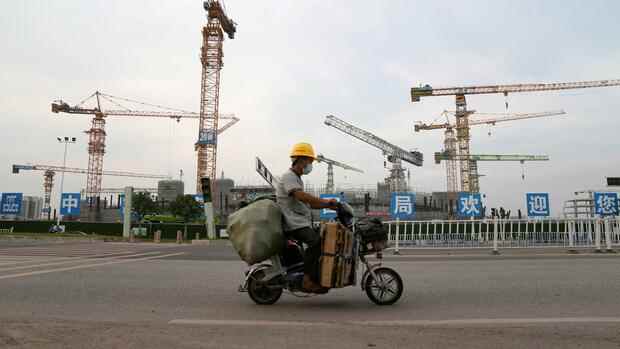Beijing The heavily indebted Chinese real estate company Evergrande apparently failed to service interest payments due on November 6, even after the 30-day grace period had expired. As reported by several media citing people familiar with the matter, it is an obligation to pay $ 82.5 million in interest on foreign bonds.
If the failure is confirmed, it would be the first time that the company has been unable to meet its payment obligations. In the past few months, the group had missed the insolvency several times.
It was already announced at the end of last week that the crisis at Evergrande would worsen. The provincial government, where the company has its headquarters, intervened on Friday after Evergrande issued a notice warning of a default.
As the government of Guangdong Province announced on Friday after the stock market closed, it would send a team to the company at Evergrande’s request to “resolve its risks, improve internal risk management and maintain normal business operations.” The Evergrande share then collapsed by 20 percent on Monday.
Top jobs of the day
Find the best jobs now and
be notified by email.
Evergrande has more than $ 300 billion in debt on its balance sheet. There is also speculation about other off-balance sheet liabilities. In the past few months, the company had made several attempts to raise liquid funds, for example by selling real estate or investments – apparently with limited success.
“Given the current liquidity status of the group, there is no guarantee that the group will have sufficient funds to continue to meet its financial commitments,” said Evergrande’s statement on Friday. The company wants to “actively work with the offshore creditors to create a workable restructuring plan for the company’s offshore debt for the benefit of all concerned.”
If Evergrande defaults, investors fear a domino effect that could spill over to other real estate developers and ultimately also affect the international financial markets. Since the real estate market and related industries are estimated to contribute around a quarter of China’s gross domestic product, analysts have already lowered their growth forecasts for the world’s second largest economy.
Other real estate developers in trouble
Not only Evergrande, but also other real estate developers had run into financial difficulties in recent months after the Chinese government announced stricter rules for borrowing in the heavily debt-financed industry in late 2020. Beijing wants to clean up the over-indebted market after real estate prices have risen higher and higher.
The Chinese leadership tried to allay investor worries over the weekend. The Evergrande case has no impact on normal financing in the real estate market, the headline “Economic Daily”, a Communist Party-controlled newspaper, said on Saturday.
The Evergrande risk case is an “isolated phenomenon” in the market economy and should “not be overestimated, but it should serve as a warning to other real estate companies and underline the importance of a solid way of working”, the article said.
“Own mismanagement” and “breakneck expansion”
Previously, in what appeared to be a coordinated action, several Chinese authorities tried to appease with individual statements on Friday, including the Chinese Central Bank (PBOC), the Chinese Securities Commissioner (CSRC), the Banking and Insurance Authority (CBIRC) and the Chinese Securities Commissioner (CSRC) and the Ministry of Housing and Rural Development (MHURD).
Evergrande’s problem is mainly caused by “its own mismanagement” and “breakneck expansion,” the PBOC said.
In order to stimulate the economy, the Chinese central bank has meanwhile given the financial institutions more leeway for lending. For the second time this year, this week it lowered the amount that banks have to hold as a minimum reserve. As of December 15, the institutes will have to hold the equivalent of around 167 billion euros less capital. This corresponds to a reduction in the reserve rate for commercial banks by half a percentage point. The lower this rate, the more credit the banks can grant.
The Chinese real estate industry is currently developing “generally healthy, and most real estate companies are focused on their main business and operate solidly,” said a spokesman for the Chinese Securities and Exchange Commission (CSRC). The effects of the risk incident at the Evergrande Group on the stable functioning of the capital market are “controllable”, it said.
More: Fear of Evergrande bankruptcy back – shares collapse.
